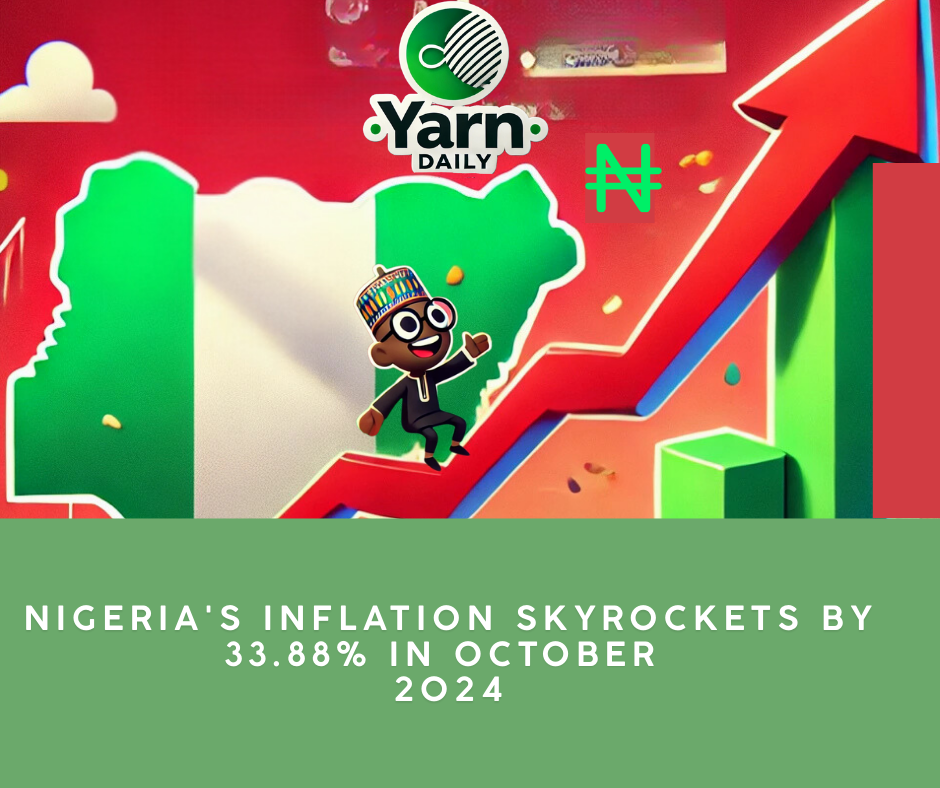
Nigeria’s Inflation Skyrockets by 33.88% in October 2024: What This Means for You
The latest inflation figures from Nigeria are startling: the headline inflation rate jumped by 33.88% in October 2024 compared to September 2024. What does this dramatic increase mean for everyday Nigerians, and how does it affect your buying power? In this article, we’ll break down the key numbers and what they mean for you.
Understanding Inflation and the CPI
The Consumer Price Index (CPI) is a measure used to track the average change in prices of goods and services that households purchase for day-to-day living. Essentially, it tells us whether items are becoming more expensive or cheaper over time. The National Bureau of Statistics (NBS) releases the CPI report, and for October 2024, the figures are alarming.
In this month’s report, the Headline Inflation was 33.88%, which indicates a steep rise in general prices compared to the previous year. This rise is evident across multiple categories, such as food, housing, transportation, and health. The CPI helps us understand which areas of daily life are most affected by inflation and provides insight into the economy as a whole.
Inflation Breakdown: The Numbers You Need to Know
The key components contributing to October’s high inflation are food, housing, and energy. Food prices continue to be a major driver, accounting for an increase of 17.55% year-on-year. The rise in food prices was driven by staples such as rice, yam, and maize—commodities that are central to the Nigerian diet.
On a year-on-year basis, the Headline inflation rate in October 2024 was 6.55 percentage points higher than in October 2023, where it was recorded at 27.33%. Month-on-month, inflation also rose, with a 2.64% increase compared to September 2024. This month-on-month rise, though smaller than the annual figure, continues to show the steady erosion of consumers’ purchasing power.
Urban vs. Rural: Who Is Affected More?
Inflation has also been analyzed in terms of urban and rural areas, with each showing different rates. Urban areas experienced an inflation rate of 36.38% year-on-year in October 2024, which was higher than the rate recorded in rural areas, at 31.59%. This suggests that residents in urban regions, who may face higher living costs, are bearing a heavier burden when it comes to inflation.
Food Inflation and Its Impact
The food inflation rate was recorded at 39.16% in October 2024, which is notably higher than the general inflation rate. This is a big concern for many households, as food makes up a significant portion of family budgets. The main contributors to food inflation are basic items like rice, guinea corn, yam, and vegetable oil. This means that for many Nigerians, putting food on the table is becoming increasingly difficult, as prices climb to unmanageable levels.
It is not just the prices of raw ingredients that are going up; prepared foods and restaurant meals are also getting more expensive, limiting options for urban dwellers who may rely on food vendors for convenience.
Which States Were Hit the Hardest?
When breaking down the numbers state-by-state, Bauchi recorded the highest inflation rate at 46.68%, while Delta recorded the lowest rise in Headline inflation at 27.85%. The reasons for these discrepancies vary, but factors such as local food supply issues, transportation costs, and even weather conditions can significantly impact inflation from one state to another.
Food inflation was also highest in Sokoto, where the food index increased by 52.18% compared to October 2023. This sharp rise is partly driven by the cost of transporting goods, as well as challenges in agricultural production due to insecurity and other factors.
Why Is Inflation Increasing So Fast?
A range of factors contribute to inflation. The most prominent reasons include:
- Exchange Rate Pressure: With the depreciation of the naira, imports have become more expensive, pushing up the cost of goods, particularly imported foods and essential commodities.
- Fuel and Energy Costs: An increase in fuel prices has made transportation more costly. This, in turn, affects the prices of almost every good in the economy since most goods need to be transported from place to place.
- Insecurity: Insecurity in major farming areas has led to decreased food production, reducing supply and causing prices to skyrocket.
How Does This Affect You?
Higher inflation means that your naira doesn’t go as far as it used to. Your savings lose value over time, and even your basic needs like food, transportation, and housing become more expensive. For those on fixed incomes, such as retirees or minimum-wage earners, inflation can be particularly devastating, eroding their quality of life and limiting their ability to afford basic necessities.
To manage the impact, households may have to make tough choices, such as cutting back on non-essential expenses, seeking additional sources of income, or relying more heavily on loans and credit, which can create a vicious cycle of debt.
Strategies to Cope with Inflation
For Nigerians grappling with the effects of rising inflation, here are some coping strategies:
- Prioritize Essential Purchases: Focus on buying essential goods and services first. During times of high inflation, non-essentials should take a back seat.
- Bulk Buying: Where possible, buy in bulk to save money in the long term. Bulk buying helps to beat future price increases, especially for non-perishable items.
- Budgeting: Create a monthly budget that clearly distinguishes between needs and wants. Sticking to a budget can help reduce impulse spending and ensure you cover all essential costs.
- Diversify Your Income Streams: Consider additional income sources, such as freelancing or starting a small business, to cushion the effects of inflation.
- Invest Wisely: To protect your savings from inflation, consider investing in assets that typically rise in value during inflation, such as real estate or precious metals.
Conclusion: Staying Informed Is Key
The inflationary environment in Nigeria, as reported for October 2024, poses a serious challenge for individuals, businesses, and policymakers alike. Understanding how inflation works and staying informed about economic trends can help you make smarter decisions regarding your finances.
It is important to keep an eye on price trends, adjust your spending habits, and consider avenues for protecting your savings against inflation. In a high-inflation environment, financial literacy and proactive management can make all the difference.
As we move forward, it remains to be seen how government policies, monetary interventions, and other macroeconomic factors will help in taming inflation. Until then, taking control of your own finances is one of the best ways to manage during these turbulent times.




